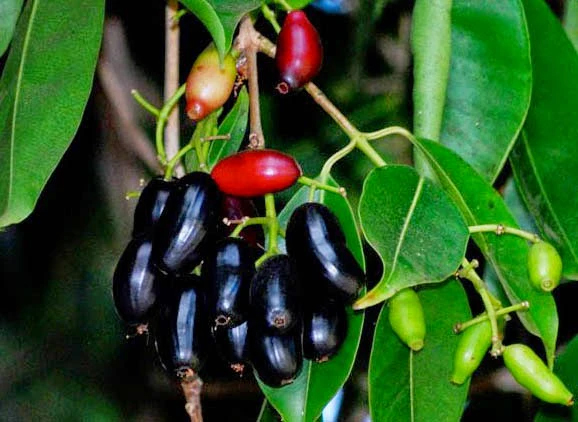Welcome to Aer Uzhavan
- Send Your Mail
- aeruzhavan24@gmail.com
- Contact Number
- +91 99947 03677 / +91 99947 03656 / +91 86105 31570
Product Detail
Naval Plants
- Naval also known as Jamun, Black Plum, or Indian Blackberry, is a tropical fruit-bearing tree native to the Indian subcontinent and Southeast Asia. The fruit, known for its deep purple to black color and sweet-sour taste, is not only consumed for its flavor but is also valued for its numerous medicinal properties.
- The Naval Tree is a medium to large evergreen tree, growing up to 30 meters in height in its natural habitat, though cultivated trees are often smaller, typically 10-15 meters tall. The tree has a dense canopy with dark green leaves that are oval and glossy.
- The fruit is a berry, usually elongated, about 2-3 cm in size, and turns from green to purple or black when ripe.
- Naval trees thrive in tropical and subtropical climates. They prefer warm temperatures, ideally between 25°C to 35°C, and are sensitive to frost.
- The tree grows best in well-drained soils, preferably loamy or sandy soils. They can tolerate slightly acidic to neutral pH (around 5.5 to 7.5).
- These trees require full sunlight to grow and produce fruit. They should be planted in an area with exposure to direct sunlight for at least 6–8 hours a day.
- The trees require ample space to grow. Typically, Java Plum trees should be planted 8–10 meters apart to avoid overcrowding and ensure healthy growth.
- The Naval is a highly versatile and beneficial tree that offers a wide range of health benefits and culinary uses. Its fruit is not only delicious and refreshing but also possesses numerous medicinal properties, making it a valuable addition to gardens, orchards, and farms in tropical and subtropical regions. Cultivating this tree requires a warm climate, well-drained soil, and proper care, but in return, it provides a nutritious and valuable crop for both local consumption and potential commercial use.

